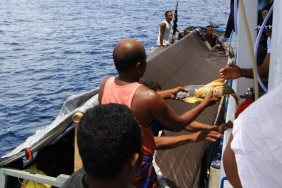BASIC CONSERVATION TRAINING: SOUTH SORONG COMMUNITY LOOKS FORWARD TO MARINE PROTECTED AREAS
"What does sustainable mean?" asked Gulam Arafat, Technical Staff from the Sorong Coastal and Marine Resource Management Workshop (PSPL) who was presenting material on marine ecosystems at the South Sorong Conservation Basics Training (31/10).
"Lestari is, my grandfather saw mangewang salib (Hammerhead Shark), my father saw, I saw, my children and grandchildren saw. Sustainable is, we cut down one mangi-mangi (mangrove), then we replant 10" Gulam continued when giving a simple example of the concept of conservation.

The training organized by WWF-Indonesia as the implementing partner of the USAID Sustainable Ecosystems Advanced (USAID SEA) Project, was attended by 30 participants representing community leaders from villages in South Sorong. These participants will bring and share conservation knowledge to the community in their home villages. In addition to the ecosystem material presented by Gulam, there were also other materials, namely, the Zoning System by Hendrik Sombo from the Sorong PSPL Workshop, Sustainable Fisheries material by Christovel Rotinsulu from the SEA Project and material on the Role of Indigenous Peoples in the Establishment of Conservation Areas by Junita Manuputty from Starling Resource.
The materials presented in this training used various methods. One of them is through conservation games and group discussions. The conservation game method is very effective to invite participants to simulate case studies of problems that can occur in the waters of South Sorong.

The conservation game on sustainable fisheries was the most popular game among the participants. Because in this game, the committee provides a map of the South Sorong region measuring 3x1.5 meters, pictures of caught fish and their fishing gear. So that participants can simulate fishing with various examples of fishing gear such as fishing rods and trawlers. During the fishing simulation, the organizers provided case studies such as fishing duration, presence or absence of zoning system and fish recruitment process.
"So the core zone will be a savings of catches for the future. If there are a lot of fish breeding in the core zone, it is impossible for the fish to be crowded in one area, they will definitely go out to a wider zone and we can catch fish from the core zone. This is the importance of zoning rules in the South Sorong region. I understand better after doing this simulation." said Laurens Segetmena, Chief of Yaben Tribe, trying to give a response after doing the simulation.





